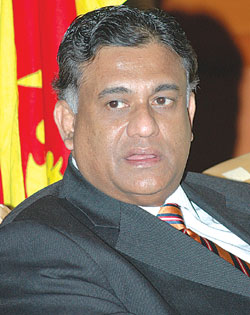 Sri Lankan Foreign Minister Rohitha Bogollagama took office after his predecessor was assassinated by suspected Tamil Tigers in 2005. During his visit to Nepal this week, he made a pilgrimage to Lumbini and spoke to Nepali Times on Tuesday after meeting Prime Minister Girija Koirala.
Sri Lankan Foreign Minister Rohitha Bogollagama took office after his predecessor was assassinated by suspected Tamil Tigers in 2005. During his visit to Nepal this week, he made a pilgrimage to Lumbini and spoke to Nepali Times on Tuesday after meeting Prime Minister Girija Koirala.
Nepali Times: How do you evaluate the past 50 years of diplomatic relations between Sri Lanka and Nepal?
Rohitha Bogollagama: It isn't just 50 years, the relations between Nepal and Sri Lanka are pre-historical. The birth of Prince Siddhartha in Lumbini, has meant that traditionally and historically we have always been close to Nepal. But in contemporary times, since the establishment of diplomatic relations in 1957 our bilateral ties have matured. The relations have now transcended culture, which is a major focus, to economic links.
One thing that has literally not taken off are air connections. There are still no direct flights between Colombo and Kathmandu.
In fact, I have just raised this matter with Prime Minsiter Koirala, and he has promised to look into it very positively and there are bilateral talks on aviation taking place in Colombo on 16-17 July. We are also looking at an international airport development in Lumbini. There are 40,000 Sri Lankans visiting Lumbini every year and this number could go up if access and hotel facilities are set up with possible Sri Lankan investment. We want to revisit the process of Lumbini development under the UN resolution.
What is the status of the Sri Lankan peace process, and how confident are you that things will be back on track?
We are a very resilient country despite all the internal and external shocks. The peace process is nothing new, we have been in this process since the 1982 Thimphu talks and the 1987 Indo-Lanka accord. The government has addressed the need for constitutional reforms and today we are looking for a process of counter-terrorism for lasting and sustained peace. As long as there is terrorism, negotiations are difficult.
But weren't these concerns a part of the 2002 agreement? What went wrong?
That was a technical agreement, the focus was to put a stop to violence and convert that into a peace process. But when you try to do that, it has to be designed in such a way that it can bring parity to both sides, so one party is not put in an advantageous position. That is what went wrong. The LTTE was able to arm itself, openly oust the law enforcement bodies, and consolidate its position.
Wasn't the Sri Lanka Monitoring Mission supposed to look at those issues?
When you change the rules to suit one party, the monitoring mission is helpless. For example, UNICEF said there were 5,400 children recruited, but the SLMM was helpless. There were 740 people killed from 2002-2005 by the LTTE, my own predecessor Lakshman Kadirgamar, was killed while in office in 2005. The SLMM was there but couldn't do much. The LTTE acquiring light aircraft, radio stations, procuring arms and artillery during this period has led to the killings of many civilians.
So, what is the lesson you have learnt from Norwegian mediation?
First thing is, you must look out for the people of your own country. It is the people who give a country its sovereignty. Second, terrorism can't be justified in any circumstance, there is zero tolerance in the civilised world today for killing people for political ends. The moderate democratic Tamil political leadership has been eliminated by the LTTE. That has made the task of finding leadership in the Tamil community very difficult. The lesson for the world is: eliminate terrorism, terrorism is everyone's problem. Democracy and pluralism are the best antidotes to terrorism, decentralising power, and administration to the periphery.
What has been your experience with having a formerly militant extreme left party in parliament and government?
The induction of militants into government was a very important factor, you must do it as early as possible. We have seen good development after the JVP got elected into parliament. They are making an effective contribution to sustainable development programs, the political process. Political parties have to be conscious of the people's sentiments, and even the tiniest political groups can have a major effect in policymaking.
India took a backseat after the IPKF debacle and the Rajiv Gandhi assassination, what is New Delhi's geopolitical role in Sri Lanka?
India's geopolitical role in the region is important. Our cultural and economic ties with India are on the positive side, we are engaging with India so it is part and parcel of our peace process. India has been constructive and has been involved in the devolution proposals since 1987. Now we have to deepen this cooperation even on the security front, for example maritime cooperation in the Palk Straits for oil exploration and to control arms and narcotics smuggling by the LTTE.


